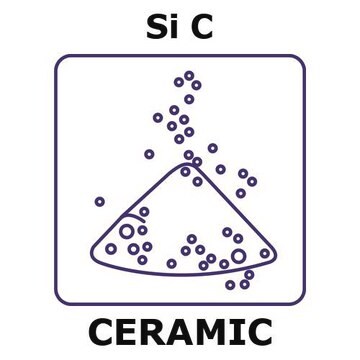594911
Silicon carbide
nanopowder, <100 nm particle size
Synonym(s):
Carbon silicide, Carborundum, Methanidylidynesilanylium, Silicon monocarbide
About This Item
Recommended Products
form
nanopowder
Quality Level
surface area
70-90 m2/g
particle size
<100 nm
mp
2700 °C (lit.)
density
3.22 g/mL at 25 °C (lit.)
bulk density
0.069 g/cm3
SMILES string
[C-]#[Si+]
InChI
1S/CSi/c1-2
InChI key
HBMJWWWQQXIZIP-UHFFFAOYSA-N
Looking for similar products? Visit Product Comparison Guide
Related Categories
General description
Application
- Overview of silicon carbide power devices: This document provides a comprehensive review of the characteristics and applications of silicon carbide (SiC) in power devices, discussing its advantages over traditional silicon devices in handling high voltages and efficiencies (Choi, 2016).
Physical form
Storage Class Code
11 - Combustible Solids
WGK
nwg
Flash Point(F)
Not applicable
Flash Point(C)
Not applicable
Personal Protective Equipment
Choose from one of the most recent versions:
Already Own This Product?
Find documentation for the products that you have recently purchased in the Document Library.
Customers Also Viewed
Articles
Composite materials that traditionally incorporate micron scale reinforcements in a bulk matrix offer opportunities to tailor material properties such as hardness, tensile strength, ductility, density, thermal and electrical conductivity, and wear resistance.
Silica is a very popular inorganic nanomaterial used in a wide range of applications including fillers for rubber, catalyst supports, separation media, carriers in food and agriculture, and abrasive/anticaking agents in cosmetics. It is also widely believed to be an important material for biomedical applications for following reasons.
White solid-state light can be generated using three different approaches: By employing three diodes that emit red, green and blue light respectively, by using a near-UV LED that excites several phosphors that emit over the complete spectral range, or the third, most widely used alternative entailing down-conversion of a portion of blue LED light to longer wavelengths in such a manner that white light emerges.
Our team of scientists has experience in all areas of research including Life Science, Material Science, Chemical Synthesis, Chromatography, Analytical and many others.
Contact Technical Service



